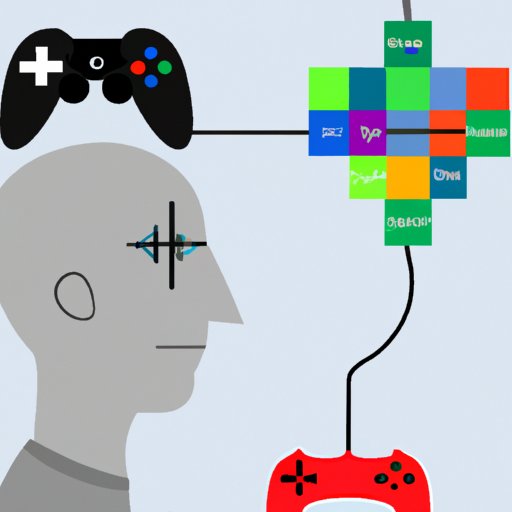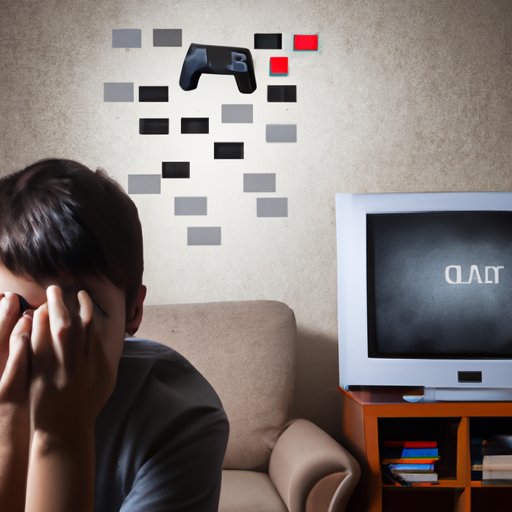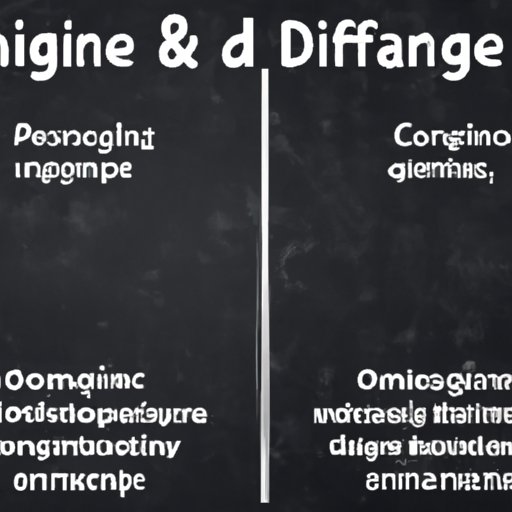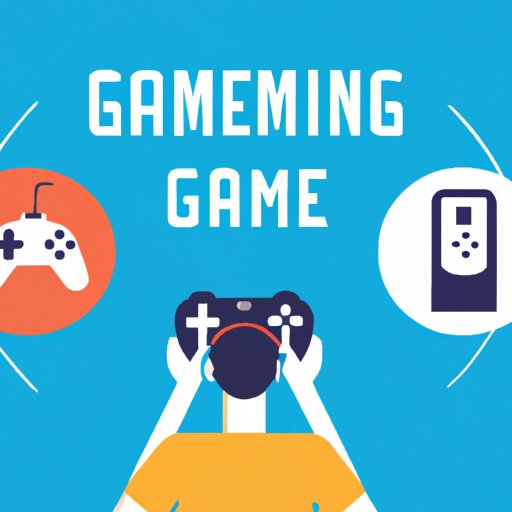Introduction
Video games have been a part of popular culture since the 1970s, when the first arcade games were released. Today, video games are an incredibly popular form of entertainment, with millions of people around the world playing them for hours each day. But are video games bad for you? This article will explore the potential benefits and risks associated with playing video games, from their impact on mental health and behavior to the potential educational benefits they offer.

Examining the Effects of Video Games on Mental Health
The effects of playing video games on mental health are complex and often disputed. Some research suggests that playing video games can lead to reduced stress and improved mood, while other studies have linked excessive video game use to depression and anxiety. According to a 2017 study published in the journal Computers in Human Behavior, “the effects of video game play on mental health vary depending on the type of game played and the amount of time spent playing.”
Generally speaking, playing video games can have both positive and negative effects on mental health. On the one hand, playing video games can help relieve stress and provide an escape from everyday life. As Dr. John Grohol, a psychologist and founder of PsychCentral.com, explains, “Video games provide a distraction from the daily grind, allowing players to get away from it all and just enjoy themselves.” Additionally, video games can improve problem-solving skills, enhance concentration, and even increase creativity.
On the other hand, playing too many video games can lead to physical and psychological problems. According to the same 2017 study, “excessive video game play has been linked to sleep disturbances, poor academic performance, social isolation, and even aggression.” Additionally, spending too much time playing video games can reduce the amount of time available for physical activity, which can lead to obesity and other health issues.
The Pros and Cons of Playing Video Games
When it comes to the pros and cons of playing video games, it’s important to consider both sides of the equation. While playing video games can have several positive effects, such as improving problem-solving skills and relieving stress, there are also some potential downsides to consider.
Advantages of Playing Video Games
There are several potential advantages to playing video games, including:
- Improving problem-solving skills and cognitive abilities
- Enhancing concentration and focus
- Increasing creativity
- Providing an escape from everyday life
- Relieving stress and improving mood
In addition, playing video games can be a great way to connect with friends and family members. According to a 2019 survey by the Entertainment Software Association, “71% of Americans play video games with others at least some of the time, and 55% of Americans play video games with others regularly.”
Disadvantages of Playing Video Games
While there are several potential advantages to playing video games, there are also some potential downsides to consider, including:
- Reduced physical activity
- Increased risk of obesity
- Sleep disturbances
- Social isolation
- Potential addiction
- Aggressive behavior
- Poor academic performance
Exploring the Impact of Violent Video Games on Behavior
The link between violent video games and aggressive behavior is highly contested. While some research suggests that playing violent video games can lead to increased levels of aggression, other studies have found no evidence of a connection. According to a 2017 meta-analysis published in the journal Psychological Bulletin, “the research provides relatively consistent evidence that violent video game play is associated with increased aggressive behavior in the short-term.”
However, it’s important to note that the effects of playing violent video games may not be long-term. As Dr. Chris Ferguson, a professor of psychology at Stetson University, explains, “while we know that violent video games do increase aggression in the short-term, we don’t know if these increases last over the long-term.” Additionally, the effects of playing violent video games may vary from person to person.
Regardless of whether or not playing violent video games leads to increased levels of aggression, there is still potential for harmful effects. According to a 2016 study published in the journal Frontiers in Psychology, “exposure to violent video games has been linked to desensitization to violence, increased aggressive thoughts and behavior, and decreased empathy towards victims of violence.”
Investigating the Benefits of Educational Video Games
While there are potential risks associated with playing video games, there are also some potential benefits. For instance, some video games offer educational benefits, such as teaching math skills or providing an introduction to computer coding. According to a 2019 study published in the journal Computers & Education, “educational video games can be effective tools for learning and can be used to supplement traditional instruction.”
In addition to teaching specific skills, educational video games can also help to improve problem-solving skills and critical thinking. As Dr. Douglas A. Gentile, a professor of psychology at Iowa State University, explains, “video games can teach kids how to solve puzzles, think strategically, and practice perseverance.” Additionally, educational video games can be used to introduce students to new concepts and ideas.

Analyzing the Effects of Excessive Video Game Use
While playing video games can have several benefits, it’s important to remember that moderation is key. Spending too much time playing video games can lead to physical and psychological problems, such as sleep disturbances, poor academic performance, and even aggressive behavior. According to the World Health Organization, “children and adolescents should not spend more than two hours per day on recreational screen activities.”
Additionally, it’s important to remember that playing video games can be addicting. According to a 2018 study published in the journal Nature Human Behaviour, “excessive video game playing has been linked to a range of psychosocial issues, including depression, anxiety, and social withdrawal.” To reduce the risk of becoming addicted to video games, it’s important to set limits on how much time is spent playing and to take regular breaks.

Comparing the Impact of Online and Offline Video Games
When it comes to the potential benefits and risks associated with playing video games, it’s important to consider both online and offline games. While there are some similarities between the two types of games, there are also some distinct differences.
What are the Differences Between Online and Offline Video Games?
The main difference between online and offline video games is that online games are played with other people over the internet. This means that players are able to interact with each other in real-time, which can lead to increased levels of engagement and collaboration. Additionally, online games tend to be more immersive and interactive than offline games.
What are the Potential Benefits and Risks of Playing Online Video Games?
Playing online video games can have several potential benefits, including improved communication and collaboration skills, increased engagement, and enhanced problem-solving abilities. However, there are also some potential risks associated with playing online video games, such as cyberbullying, exposure to inappropriate content, and the potential for addiction.
Conclusion
In conclusion, playing video games can have both positive and negative effects on mental health and behavior. While playing video games can offer several potential benefits, such as improved problem-solving skills and increased creativity, there are also some potential risks to consider, including sleep disturbances, poor academic performance, and even aggressive behavior. Additionally, it’s important to remember that moderation is key when it comes to playing video games, as spending too much time playing can lead to physical and psychological problems. Finally, it’s important to consider both online and offline games, as there are some distinct differences between the two.
Takeaways
- Playing video games can have both positive and negative effects on mental health and behavior.
- Playing violent video games may lead to increased levels of aggression, but the effects may not be long-term.
- Educational video games can provide several potential benefits, such as improved problem-solving skills and an introduction to new concepts.
- Spending too much time playing video games can lead to physical and psychological problems.
- Online video games can offer several potential benefits, but there are also some potential risks to consider.
(Note: Is this article not meeting your expectations? Do you have knowledge or insights to share? Unlock new opportunities and expand your reach by joining our authors team. Click Registration to join us and share your expertise with our readers.)
